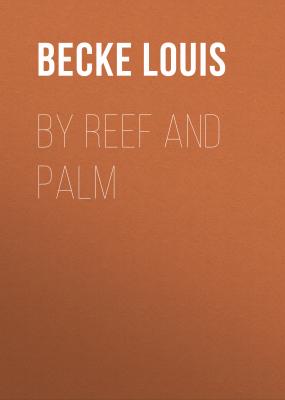ТОП просматриваемых книг сайта:
By Reef and Palm. Becke Louis
Читать онлайн.Название By Reef and Palm
Год выпуска 0
isbn
Автор произведения Becke Louis
Жанр Зарубежная классика
Издательство Public Domain
"E MATE! [Dead!]" he said.
THE RANGERS OF THE TIA KAU
Between Nanomea and Nanomaga—two of the Ellice Group—but within a few miles of the latter, is an extensive submerged shoal, on the charts called the Grand Cocal Reef, but by the people of the two islands known as Tia Kau (The Reef). On the shallowest part there are from four to ten fathoms of water, and here in heavy weather the sea breaks. The British cruiser BASILISK, about 1870, sought for the reef, but reported it as non-existent. Yet the Tia Kati is well known to many a Yankee whaler and trading schooner, and is a favourite fishing-ground of the people of Nanomaga—when the sharks give them a chance.
One night Atupa, Chief of Nanomaga, caused a huge fire to be lit on the beach as a signal to the people of Nanomea that a MALAGA, or party of voyagers, was coming over. Both islands are low—not more than fifteen feet above sea-level—and are distant from one another about thirty-eight miles. The following night the reflection of the answering fire on Nanomea was seen, and Atupa prepared to send away his people in seven canoes. They would start at sundown, so as to avoid paddling in the heat (the Nanomagans have no sailing canoes), and be guided to Nanomea, which they expected to reach early in the morning, by the far distant glare of the great fires of coconut and pandanus leaves kindled at intervals of a few hours. About seventy people were to go, and all that day the little village busied itself in preparing for the Nanomeans gifts of foods—cooked PURAKA, fowls, pigs, and flying-fish.
Atupa, the heathen chief, was troubled in his mind in those days of August 1872. The JOHN WILLIAMS had touched at the island and landed a Samoan missionary, who had pressed him to accept Christianity. Atupa, dreading a disturbing element in his little community, had, at first, declined; but the ship had come again, and the chief having consented to try the new religion, a teacher landed. But since then he and his sub-chiefs had consulted the oracle, and had been told that the shades of Maumau Tahori and Foilagi, their deified ancestors, had answered that the new religion was unacceptable to them, and that the Samoan teacher must be killed or sent away. And for this was Atupa sending off some of his people to Nanomea with gifts of goodwill to the chiefs to beseech them to consult their oracles also, so that the two islands might take concerted action against this new foreign god, whose priests said that all men were equal, that all were bad, and He and His Son alone good.
The night was calm when the seven canoes set out. Forty men and thirty women and children were in the party, and the craft were too deeply laden for any but the smoothest sea. On the AMA (outrigger) of each canoe were the baskets of food and bundles of mats for their hosts, and seated on these were the children, while the women sat with the men and helped them to paddle. Two hours' quick paddling brought them to the shoal-water of Tia Kau, and at the same moment they saw to the N.W. the sky-glare of the first guiding fire.
It was then that the people in the first canoe, wherein was Palu, the daughter of Atupa, called out to those behind to prepare their ASU (balers), as a heavy squall was coming down from the eastward. Then Laheu, an old warrior in another canoe, cried out that they should return on their track a little and get into deep water; "for," said he, "if we swamp, away from Tia Kau, it is but a little thing, but here—" and he clasped his hands rapidly together and then tore them apart. They knew what he meant—the sharks that, at night-time forsaking the deep waters, patrolled in droves of thousands the shallow waters of the reef to devour the turtle and the schools of TAFAU ULI and other fish. In quick, alarmed silence the people headed back, but even then the first fierce squall struck them, and some of the frail canoes began to fill at once. "I MATAGI! I MATAGI! (head to the wind)" a man called out; "head to the wind, or we perish! 'Tis but a puff and it is gone."
Конец ознакомительного фрагмента.
Текст предоставлен ООО «ЛитРес».
Прочитайте эту книгу целиком, купив полную легальную версию на ЛитРес.
Безопасно оплатить книгу можно банковской картой Visa, MasterCard, Maestro, со счета мобильного телефона, с платежного терминала, в салоне МТС или Связной, через PayPal, WebMoney, Яндекс.Деньги, QIWI Кошелек, бонусными картами или другим удобным Вам способом.

